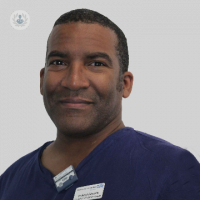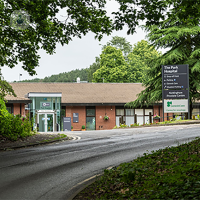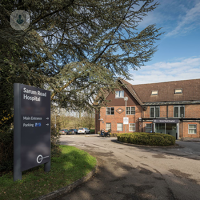What is radiotherapy?
Radiotherapy is a cancer treatment that uses high doses of radiation to eliminate cancer cells and reduce tumours. There are two main types of radiotherapy:
- External beam radiotherapy: a beam of radiation is aimed at the tumour from outside the body.
- Internal radiotherapy: in this type of treatment, the source of radiation is placed inside the patient’s body. The radiation source may be a solid or a liquid. The technique is called brachytherapy if the source is solid and systemic radiotherapy if the source is liquid.

Why is it done?
The treatment is used to destroy cancer cells and slow the growth of tumours without harming nearby healthy tissue. More than half of people with cancer receive some type of radiotherapy. In some cases, it is the only treatment required.
Radiotherapy has several applications:
- before surgery, to reduce the size of a tumour so that surgery is more straightforward
- after surgery or chemotherapy, so that the cancer does not return
- in cases in which the cancer cannot be eliminated, palliative radiotherapy may be used to reduce the size of the tumour and hence lessen the symptoms
- in cases in which the cancer cannot be surgically removed
What does it involve?
Radiotherapy damages the DNA of cancer cells, causing them to die or slowing their growth rate. When cancer cells are damaged, they break apart and are then discarded by the body.
Radiotherapy does not eliminate cancer cells immediately. The treatment starts having an effect after some days or weeks. Once the cancer cells start dying, they carry on dying for weeks or months after the end of the treatment.
Several factors are taken into consideration to determine the type of radiotherapy to be administered, including:
- the type of cancer
- the size and location of the cancer
- the proximity of the tumour to normal tissues sensitive to radiation.
- the patient’s general condition and age
- the patient’s medical history
How to prepare for radiotherapy
It is important that you receive clear information about what the treatment will consist of, how long it will take and when it will be carried out. You should also receive information about possible side effects.
You must be well nourished and must tell the medical team any medications or supplements you are taking.
What does aftercare following radiotherapy treatment involve?
After the intervention, you will continue to have appointments with the doctor to check that the treatment is working and that the cancer has not returned. You will be given dietary advice, including eating fruit, vegetables and whole-grain cereals. A healthy diet and strong immune system are important as you will be at higher risk of developing other medical conditions.
You will also receive other recommendations such as to stop smoking, maintain a healthy body weight, cut down or give up alcohol, and be physically active.
What are the main alternatives to radiotherapy?
There are alternatives to radiotherapy. In some cases, treatments such as the following are administered at the same time as or after radiotherapy:
01-16-2013 10-20-2023Radiotherapy
Professor Chris Nutting - Clinical oncology
Created on: 01-16-2013
Updated on: 10-20-2023
Edited by: Conor Lynch
What is radiotherapy?
Radiotherapy is a cancer treatment that uses high doses of radiation to eliminate cancer cells and reduce tumours. There are two main types of radiotherapy:
- External beam radiotherapy: a beam of radiation is aimed at the tumour from outside the body.
- Internal radiotherapy: in this type of treatment, the source of radiation is placed inside the patient’s body. The radiation source may be a solid or a liquid. The technique is called brachytherapy if the source is solid and systemic radiotherapy if the source is liquid.

Why is it done?
The treatment is used to destroy cancer cells and slow the growth of tumours without harming nearby healthy tissue. More than half of people with cancer receive some type of radiotherapy. In some cases, it is the only treatment required.
Radiotherapy has several applications:
- before surgery, to reduce the size of a tumour so that surgery is more straightforward
- after surgery or chemotherapy, so that the cancer does not return
- in cases in which the cancer cannot be eliminated, palliative radiotherapy may be used to reduce the size of the tumour and hence lessen the symptoms
- in cases in which the cancer cannot be surgically removed
What does it involve?
Radiotherapy damages the DNA of cancer cells, causing them to die or slowing their growth rate. When cancer cells are damaged, they break apart and are then discarded by the body.
Radiotherapy does not eliminate cancer cells immediately. The treatment starts having an effect after some days or weeks. Once the cancer cells start dying, they carry on dying for weeks or months after the end of the treatment.
Several factors are taken into consideration to determine the type of radiotherapy to be administered, including:
- the type of cancer
- the size and location of the cancer
- the proximity of the tumour to normal tissues sensitive to radiation.
- the patient’s general condition and age
- the patient’s medical history
How to prepare for radiotherapy
It is important that you receive clear information about what the treatment will consist of, how long it will take and when it will be carried out. You should also receive information about possible side effects.
You must be well nourished and must tell the medical team any medications or supplements you are taking.
What does aftercare following radiotherapy treatment involve?
After the intervention, you will continue to have appointments with the doctor to check that the treatment is working and that the cancer has not returned. You will be given dietary advice, including eating fruit, vegetables and whole-grain cereals. A healthy diet and strong immune system are important as you will be at higher risk of developing other medical conditions.
You will also receive other recommendations such as to stop smoking, maintain a healthy body weight, cut down or give up alcohol, and be physically active.
What are the main alternatives to radiotherapy?
There are alternatives to radiotherapy. In some cases, treatments such as the following are administered at the same time as or after radiotherapy:
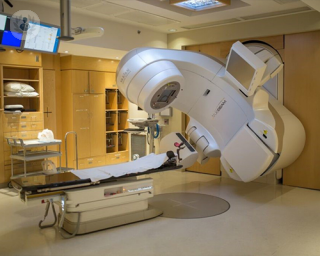

The guide to radiation therapies for breast cancer
By Dr Shiroma De Silva-Minor
2024-12-26
Consultant breast oncologist Dr Shiroma De Silva-Minor understands the importance of providing comprehensive information about the types of radiotherapy used in the treatment of breast cancer. In this article, she imparts her expertise in radiotherapy so that patients can explore their options and be informed before they begin treatment. See more


Target IORT: Intraoperative radiotherapy for breast cancer
By Professor Jayant Vaidya
2024-12-26
Revered consultant oncoplastic breast surgeon and professor of surgery Professor Jayant Vaidya discusses intraoperative radiotherapy in the treatment of breast cancer. See more
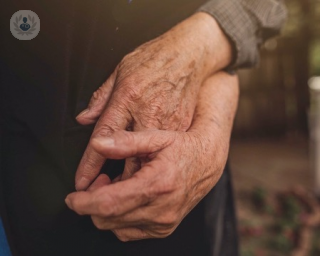

Radiotherapy for Dupuytren’s contracture
By Dr Richard Shaffer
2024-12-26
Did you know, approximately 1 in 6 men over the age of 65 in the UK have Dupuytren's contracture. We recently got in contact with one of our highly experienced clinical oncologists, Dr Richard Shaffer, to discuss radiotherapy as a treatment option. In this article, he highlights what can be expected from it, its effectiveness and what the longterm and short term effects are. See more


Radiotherapy for knee osteoarthritis
By Dr Richard Shaffer
2024-12-26
Radiotherapy for knee osteoarthritis involves low-dose radiation targeting the knee joint, which reduces pain and inflammation and improve function and mobility. This treatment can offer symptomatic relief when other conservative measures fail. Here to explain more is distinguished specialist and clinical oncologist Dr Richard Shaffer, who discusses how radiotherapy can alleviate pain caused by knee osteoarthritis. See more
Experts in Radiotherapy
-
Professor Chris Nutting
Clinical oncologyExpert in:
- Intensity-modulated radiation therapy (IMRT)
- Thyroid cancer
- Head and neck cancer
- CyberKnife
- Radiotherapy
-
Professor Heather Payne
Clinical oncologyExpert in:
- Prostate cancer
- Radiotherapy
- Hormone therapy
- Image guided radiotherapy (IGRT)
- Intensity-modulated radiation therapy (IMRT)
- Targeted therapy
-
Dr Sarah Partridge
Clinical oncologyExpert in:
- Head and neck cancer
- Thyroid cancer
- Radiotherapy
- Chemotherapy
- Immunotherapy
- Cancer
-
Dr Albert Edwards
Clinical oncologyExpert in:
- Brachytherapy for prostate cancer
- Prostate cancer
- Radiotherapy
- Proton beam therapy
- Bladder cancer
- Chemotherapy
-
Dr Matthew Williams
Clinical oncologyExpert in:
- Brain tumour
- Metastasis
- Keloid scars
- Radiotherapy
- Skin cancer
- Spinal cancer
- See all

The Park Hospital - part of Circle Health Group
The Park Hospital - part of Circle Health Group
Sherwood Lodge Drive, Burntstump Country Park, Arnold, Nottinghamshire NG5 8RX
No existe teléfono en el centro.
By using the telephone number provided by TOP DOCTORS, you automatically agree to let us use your phone number for statistical and commercial purposes. For further information, read our Privacy Policy
Top Doctors

Sarum Road Hospital - part of Circle Health Group
Sarum Road Hospital - part of Circle Health Group
Sarum Rd, Winchester SO22 5HA
No existe teléfono en el centro.
By using the telephone number provided by TOP DOCTORS, you automatically agree to let us use your phone number for statistical and commercial purposes. For further information, read our Privacy Policy
Top Doctors

LOC at Chelsea (HCA)
LOC at Chelsea (HCA)
102 Sydney St, London
No existe teléfono en el centro.
By using the telephone number provided by TOP DOCTORS, you automatically agree to let us use your phone number for statistical and commercial purposes. For further information, read our Privacy Policy
Top Doctors
-
The Park Hospital - part of Circle Health Group
Sherwood Lodge Drive, Burntstump Country Park, Arnold, Nottinghamshire NG5 8RX, ArnoldExpert in:
- General Surgery
- Maxillofacial Surgery
- Oral surgery
- Plastic surgery, reconstructive and aesthetics
- Obstetrics and Gynaecology
- Podiatry
-
Sarum Road Hospital - part of Circle Health Group
Sarum Rd, Winchester SO22 5HA, WinchesterExpert in:
- Vascular Surgery
- Cardiology
- Shoulder surgery
- Hand surgery
- General Surgery
- Orthopaedic surgery
-
LOC at Chelsea (HCA)
102 Sydney St, London, Central LondonExpert in:
- Cancer
- Breast Cancer
- Skin Cancer
- Prostate Cancer
- Kidney Cancer
- Thyroid cancer
- See all
- Most viewed diseases, medical tests, and treatments
- Immunotherapy
- Electrophysiology study
- CAR-T cells
- Hormone therapy
- Hodgkin's lymphoma
- Weight loss injections
- Genetic testing
- Nipple discharge
- Abdominal pain
- Endovenous laser treatment (EVLA)



